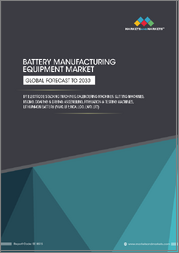
|
시장보고서
상품코드
1900168
배터리 제조 장비 시장 규모, 점유율, 성장 분석 : 제품 유형별, 배터리 유형별, 장비 유형별, 용도별, 지역별 - 업계 예측(2026-2033년)Battery Manufacturing Equipment Market Size, Share, and Growth Analysis, By Product (Assembly & Handling Machine, Calendaring), By Battery Type, By Equipment Type, By Application, By Region - Industry Forecast 2026-2033 |
||||||
세계의 배터리 제조 장비 시장 규모는 2024년에 74억 8,000만 달러로 평가되었고, 2025년 81억 1,000만 달러에서 2033년까지 154억 6,000만 달러로 성장할 전망이며, 예측 기간(2026-2033년) CAGR은 8.4%를 보일 것으로 예측됩니다.
전기자동차의 보급 확대에 따라 자동차 업계가 요구하는 출력 요건을 충족시키기 위해 각 제조업체들이 배터리 제조 장비 수요를 주도하고 있습니다. 환경 문제에 대한 인식이 높아지면서 배터리 제조업체들은 첨단 제조 기술을 통해 생산 능력을 강화해야 하는 상황에 직면해 있습니다. 이러한 배터리 업체 간 경쟁 구도는 늘어나는 전기차 생산 수요를 충족시키기 위한 생산량 확대를 촉진하고 있습니다. 또한, 다양한 휴대용 기기가 보급되고 고정된 전원에 의존하지 않고 휴대가 간편하고 편리해짐에 따라 배터리 제조 장비 시장이 확대되고 있습니다. 이 장비의 적응성은 시장 내에서 새로운 기회를 창출하고, 궁극적으로 소비자와 산업의 진화하는 수요에 따른 견고한 성장 궤도를 뒷받침하고 있습니다.
세계 배터리 제조 장비 시장 성장 촉진요인
태양광, 풍력 등 재생에너지원에 대한 전 세계적인 추진은 본질적인 예측 불가능성이 특징이며, 안정적이고 신뢰할 수 있는 에너지 공급을 보장하기 위해서는 견고한 에너지 저장 시스템(ESS)이 필수적입니다. 리튬 이온 배터리가 이러한 시스템의 기반이 되기 때문에 배터리 생산량 증가에 대한 수요는 첨단 배터리 제조 장비의 필요성을 높이고 있습니다. 그 결과, 지속 가능한 에너지 인프라를 지원하고 변동성이 큰 재생에너지 발전의 문제를 해결하기 위한 효율적인 에너지 저장 솔루션에 대한 수요 증가에 대응하기 위해 제조업체들이 생산 능력을 강화하면서 배터리 제조 기계 시장이 크게 성장하고 있습니다.
세계 배터리 제조 장비 시장 성장 억제요인
세계 배터리 제조 장비 시장은 제조 공장 설립에 많은 자금이 필요하기 때문에 몇 가지 문제에 직면해 있습니다. 이는 막대한 자본 투자가 수반되는 일입니다. 또한, 다양한 배터리 유형과 기술에 대응하는 전용 기계의 필요성이 생산 공정의 복잡성을 증폭시키고 있습니다. 각 장비는 디자인, 크기, 사양, 기술 요구 사항이 다르기 때문에 총 비용이 증가합니다. 이러한 요인들이 복합적으로 작용하여 높은 투자 수준과 신규 진입 장벽을 만들어 배터리 제조 장비 부문의 성장 잠재력을 제한하고 있습니다.
세계 배터리 제조 장비 시장 동향
세계 배터리 제조 장비 시장은 첨단 배터리 재활용 기술의 통합이 진행됨에 따라 눈에 띄는 상승 추세를 보이고 있습니다. 지속 가능한 실천에 대한 노력이 강화되는 가운데, 배터리 재활용은 온실 가스 배출량 감소, 배터리 수명 연장, 생산 비용 절감을 실현할 수 있는 기회를 제공합니다. 이에 따라 재활용 소재를 효율적으로 처리하여 새로운 배터리로 가공할 수 있는 첨단 제조 장비에 대한 수요가 증가하고 있습니다. 재활용 기술의 혁신이 진행됨에 따라 각 제조업체들은 이 급성장하는 분야를 활용하기 위해 최첨단 공구와 기계 도입에 주력하고 있으며, 이를 통해 배터리 생산의 환경적, 경제적 실현 가능성을 높이고 있습니다.
자주 묻는 질문
목차
서론
- 조사 목적
- 조사 범위
- 정의
조사 방법
- 정보 조달
- 2차와 1차 데이터 방법
- 시장 규모 예측
- 시장 전제조건과 제한
주요 요약
- 세계 시장 전망
- 수급 동향 분석
- 부문별 기회 분석
시장 역학과 전망
- 시장 규모
- 시장 역학
- 성장 촉진요인과 기회
- 성장 억제요인과 과제
- Porter의 Five Forces 분석
주요 시장 인사이트
- 중요 성공 요인
- 경쟁 정도
- 주요 투자 기회
- 시장 생태계
- 시장의 매력 지수(2025년)
- PESTEL 분석
- 거시경제 지표
- 밸류체인 분석
- 가격 분석
세계의 배터리 제조 장비 시장 규모 : 제품별&CAGR(2026-2033)
- 조립 및 운반 장비
- 캘린더 가공
- 코팅 및 건조기
- 전극 적층
- 형성 및 시험기
- 혼합
- 슬리팅
세계의 배터리 제조 장비 시장 규모 : 배터리 유형별&CAGR(2026-2033)
- 인산 철 리튬
- 니켈 코발트 알루미늄
- 니켈 망간 코발트
세계의 배터리 제조 장비 시장 규모 : 기기별&CAGR(2026-2033)
- 배터리 검사 및 시험 장비
- 셀 조립 장비
- 전극 제조 장비
- 포메이션 및 에이징 장비
세계의 배터리 제조 장비 시장 규모 : 용도별&CAGR(2026-2033)
- 자동차
- 가전제품
- 산업
- 재생에너지
세계의 배터리 제조 장비 시장 규모&CAGR(2026-2033)
- 북미
- 미국
- 캐나다
- 유럽
- 독일
- 스페인
- 프랑스
- 영국
- 이탈리아
- 기타 유럽
- 아시아태평양
- 중국
- 인도
- 일본
- 한국
- 기타 아시아태평양
- 라틴아메리카
- 브라질
- 기타 라틴아메리카
- 중동 및 아프리카
- GCC 국가
- 남아프리카공화국
- 기타 중동 및 아프리카
경쟁 정보
- 주요 5개사 비교
- 주요 기업의 시장 포지셔닝(2025년)
- 주요 시장 기업이 채택한 전략
- 최근 시장 동향
- 기업의 시장 점유율 분석(2025년)
- 주요 기업 개요
- 기업 상세
- 제품 포트폴리오 분석
- 기업 부문별 점유율 분석
- 매출 전년대비 비교(2023-2025년)
주요 기업 개요
- Manz AG(Germany)
- Durr AG(Germany)
- Atlas Copco AB(Sweden)
- Comau S.p.A.(Italy)
- Hirano Tecseed Co., Ltd.(Japan)
- Toray Engineering Co., Ltd.(Japan)
- PNE Solution Co., Ltd.(South Korea)
- Lead Equipment Technology Co., Ltd.(China)
- Hangzhou Hangke Technology Inc.(China)
- Wuxi Lead Intelligent Equipment Co., Ltd.(China)
- Sovema S.p.A.(Italy)
- Koenig & Bauer AG(Germany)
- INELTEK GmbH(Germany)
- MTS Systems Corporation(USA)
- Applied Materials, Inc.(USA)
- Nordson Corporation(USA)
- Testing Machines Inc.(USA)
- ULVAC, Inc.(Japan)
- Horiba, Ltd.(Japan)
- Keysight Technologies, Inc.(USA)
결론과 제안
LSH 26.01.19Global Battery Manufacturing Equipment Market size was valued at USD 7.48 Billion in 2024 and is poised to grow from USD 8.11 Billion in 2025 to USD 15.46 Billion by 2033, growing at a CAGR of 8.4% during the forecast period (2026-2033).
The surge in electric vehicle adoption is driving demand for battery manufacturing equipment, as manufacturers strive to meet the automotive sector's specific requirements for power output. As awareness of environmental issues grows, battery producers are prompted to enhance production capabilities through advanced manufacturing technologies. This competitive landscape among battery manufacturers is facilitating increased output to satisfy the rising needs of electric vehicle production. Additionally, the battery manufacturing equipment market is expanding as a diverse range of portable devices becomes available, allowing for ease of transport and convenience without dependency on fixed power sources. This adaptability in equipment is creating new opportunities within the market, ultimately contributing to its robust growth trajectory in line with evolving consumer and industry demands.
Top-down and bottom-up approaches were used to estimate and validate the size of the Global Battery Manufacturing Equipment market and to estimate the size of various other dependent submarkets. The research methodology used to estimate the market size includes the following details: The key players in the market were identified through secondary research, and their market shares in the respective regions were determined through primary and secondary research. This entire procedure includes the study of the annual and financial reports of the top market players and extensive interviews for key insights from industry leaders such as CEOs, VPs, directors, and marketing executives. All percentage shares split, and breakdowns were determined using secondary sources and verified through Primary sources. All possible parameters that affect the markets covered in this research study have been accounted for, viewed in extensive detail, verified through primary research, and analyzed to get the final quantitative and qualitative data.
Global Battery Manufacturing Equipment Market Segments Analysis
Global Battery Manufacturing Equipment Market is segmented by Product, Battery Type, Equipment Type, Application and region. Based on Product, the market is segmented into Assembly & Handling Machine, Calendaring, Coating & Dryer, Electrode Stacking, Formation & Testing Machine, Mixing and Slitting. Based on Battery Type, the market is segmented into Lithium Iron Phosphate, Nickel Cobalt Aluminum and Nickel Manganese Cobalt. Based on Equipment Type, the market is segmented into Battery Inspection & Testing Equipment, Cell Assembly Equipment, Electrode Manufacturing Equipment and Formation & Aging Equipment. Based on Application, the market is segmented into Automotive, Consumer Electronics, Industrial and Renewable Energy. Based on region, the market is segmented into North America, Europe, Asia Pacific, Latin America and Middle East & Africa.
Driver of the Global Battery Manufacturing Equipment Market
The global push for renewable energy sources, such as solar and wind, is marked by their inherent unpredictability, necessitating robust energy storage systems (ESS) to ensure a constant and reliable energy supply. As lithium-ion batteries serve as the cornerstone of these systems, the demand for increased battery production is driving the need for advanced battery manufacturing equipment. Consequently, the market for battery manufacturing machinery is expanding significantly, as manufacturers seek to enhance their production capabilities to meet the growing requirements for efficient energy storage solutions that support sustainable energy infrastructure and address the challenges posed by variable renewable energy generation.
Restraints in the Global Battery Manufacturing Equipment Market
The Global Battery Manufacturing Equipment market faces several challenges due to the significant financial commitment required to establish a manufacturing plant, which entails substantial capital investments. The complexity of the production process is further compounded by the necessity for diverse machinery tailored to different battery types and technologies. Each piece of equipment varies in design, size, specifications, and technological requirements, which amplifies overall costs. This combination of factors contributes to elevated investment levels, creating a barrier for new entrants and limiting growth potential within the battery manufacturing equipment sector.
Market Trends of the Global Battery Manufacturing Equipment Market
The Global Battery Manufacturing Equipment market is witnessing a significant upward trend driven by the rising integration of advanced battery recycling technologies. As the push for sustainable practices intensifies, battery recycling presents an opportunity to reduce greenhouse gas emissions while extending battery lifespan and lowering production costs. This evolution necessitates the demand for sophisticated manufacturing equipment capable of efficiently processing recycled materials into new batteries. As innovation in recycling technology continues to advance, manufacturers are increasingly focusing on equipping themselves with cutting-edge tools and machinery to capitalize on this burgeoning sector, thereby enhancing both environmental and economic viability in battery production.
Table of Contents
Introduction
- Objectives of the Study
- Scope of the Report
- Definitions
Research Methodology
- Information Procurement
- Secondary & Primary Data Methods
- Market Size Estimation
- Market Assumptions & Limitations
Executive Summary
- Global Market Outlook
- Supply & Demand Trend Analysis
- Segmental Opportunity Analysis
Market Dynamics & Outlook
- Market Overview
- Market Size
- Market Dynamics
- Drivers & Opportunities
- Restraints & Challenges
- Porters Analysis
- Competitive rivalry
- Threat of substitute
- Bargaining power of buyers
- Threat of new entrants
- Bargaining power of suppliers
Key Market Insights
- Key Success Factors
- Degree of Competition
- Top Investment Pockets
- Market Ecosystem
- Market Attractiveness Index, 2025
- PESTEL Analysis
- Macro-Economic Indicators
- Value Chain Analysis
- Pricing Analysis
Global Battery Manufacturing Equipment Market Size by Product & CAGR (2026-2033)
- Market Overview
- Assembly & Handling Machine
- Calendaring
- Coating & Dryer
- Electrode Stacking
- Formation & Testing Machine
- Mixing
- Slitting
Global Battery Manufacturing Equipment Market Size by Battery Type & CAGR (2026-2033)
- Market Overview
- Lithium Iron Phosphate
- Nickel Cobalt Aluminum
- Nickel Manganese Cobalt
Global Battery Manufacturing Equipment Market Size by Equipment Type & CAGR (2026-2033)
- Market Overview
- Battery Inspection & Testing Equipment
- Cell Assembly Equipment
- Electrode Manufacturing Equipment
- Formation & Aging Equipment
Global Battery Manufacturing Equipment Market Size by Application & CAGR (2026-2033)
- Market Overview
- Automotive
- Consumer Electronics
- Industrial
- Renewable Energy
Global Battery Manufacturing Equipment Market Size & CAGR (2026-2033)
- North America (Product, Battery Type, Equipment Type, Application)
- US
- Canada
- Europe (Product, Battery Type, Equipment Type, Application)
- Germany
- Spain
- France
- UK
- Italy
- Rest of Europe
- Asia Pacific (Product, Battery Type, Equipment Type, Application)
- China
- India
- Japan
- South Korea
- Rest of Asia-Pacific
- Latin America (Product, Battery Type, Equipment Type, Application)
- Brazil
- Rest of Latin America
- Middle East & Africa (Product, Battery Type, Equipment Type, Application)
- GCC Countries
- South Africa
- Rest of Middle East & Africa
Competitive Intelligence
- Top 5 Player Comparison
- Market Positioning of Key Players, 2025
- Strategies Adopted by Key Market Players
- Recent Developments in the Market
- Company Market Share Analysis, 2025
- Company Profiles of All Key Players
- Company Details
- Product Portfolio Analysis
- Company's Segmental Share Analysis
- Revenue Y-O-Y Comparison (2023-2025)
Key Company Profiles
- Manz AG (Germany)
- Company Overview
- Business Segment Overview
- Financial Updates
- Key Developments
- Durr AG (Germany)
- Company Overview
- Business Segment Overview
- Financial Updates
- Key Developments
- Atlas Copco AB (Sweden)
- Company Overview
- Business Segment Overview
- Financial Updates
- Key Developments
- Comau S.p.A. (Italy)
- Company Overview
- Business Segment Overview
- Financial Updates
- Key Developments
- Hirano Tecseed Co., Ltd. (Japan)
- Company Overview
- Business Segment Overview
- Financial Updates
- Key Developments
- Toray Engineering Co., Ltd. (Japan)
- Company Overview
- Business Segment Overview
- Financial Updates
- Key Developments
- PNE Solution Co., Ltd. (South Korea)
- Company Overview
- Business Segment Overview
- Financial Updates
- Key Developments
- Lead Equipment Technology Co., Ltd. (China)
- Company Overview
- Business Segment Overview
- Financial Updates
- Key Developments
- Hangzhou Hangke Technology Inc. (China)
- Company Overview
- Business Segment Overview
- Financial Updates
- Key Developments
- Wuxi Lead Intelligent Equipment Co., Ltd. (China)
- Company Overview
- Business Segment Overview
- Financial Updates
- Key Developments
- Sovema S.p.A. (Italy)
- Company Overview
- Business Segment Overview
- Financial Updates
- Key Developments
- Koenig & Bauer AG (Germany)
- Company Overview
- Business Segment Overview
- Financial Updates
- Key Developments
- INELTEK GmbH (Germany)
- Company Overview
- Business Segment Overview
- Financial Updates
- Key Developments
- MTS Systems Corporation (USA)
- Company Overview
- Business Segment Overview
- Financial Updates
- Key Developments
- Applied Materials, Inc. (USA)
- Company Overview
- Business Segment Overview
- Financial Updates
- Key Developments
- Nordson Corporation (USA)
- Company Overview
- Business Segment Overview
- Financial Updates
- Key Developments
- Testing Machines Inc. (USA)
- Company Overview
- Business Segment Overview
- Financial Updates
- Key Developments
- ULVAC, Inc. (Japan)
- Company Overview
- Business Segment Overview
- Financial Updates
- Key Developments
- Horiba, Ltd. (Japan)
- Company Overview
- Business Segment Overview
- Financial Updates
- Key Developments
- Keysight Technologies, Inc. (USA)
- Company Overview
- Business Segment Overview
- Financial Updates
- Key Developments



















